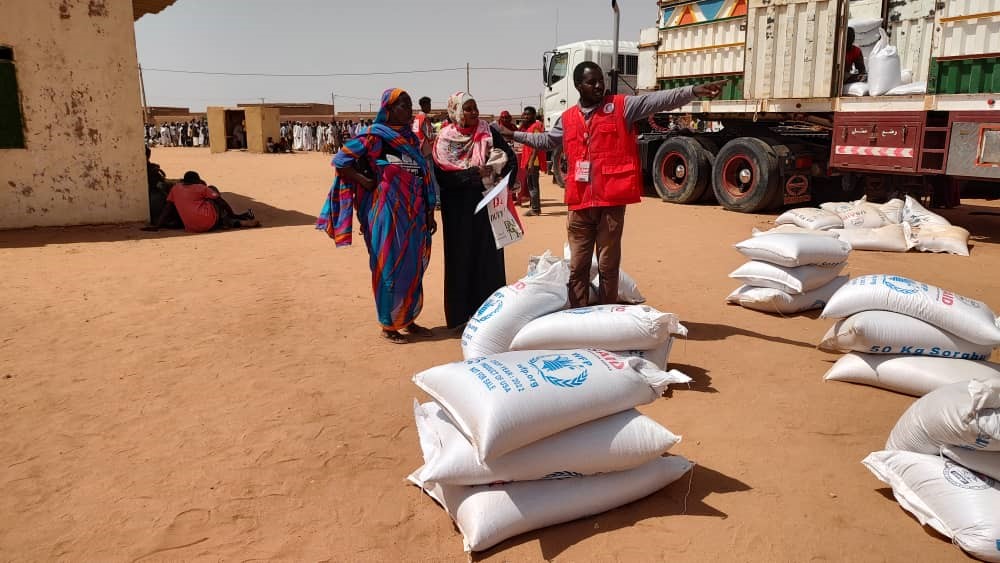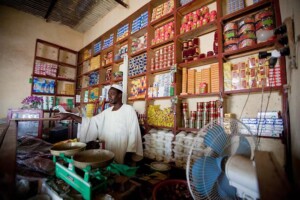Living conditions worsen as soaring prices grip Sudan

Food distribution in Omdurman, May 29 (Photo: WFP / Sudanese Red Crescent)
KHARTOUM / ZALINGEI / EL GENEINA / EL OBEID / EL FASHER –
People across Sudan face deteriorating living conditions, soaring prices, and communication breakdowns, amid the ongoing fighting. Uncertainty looms over the Darfur region due to recent attacks, which have severed communication networks.
The impact of the ongoing 46-day war in Khartoum continues to worsen, with the humanitarian and living situation deteriorating rapidly. Residents of Omdurman have raised concerns over the frequent interruption of the water supply, further compromising their daily lives. The situation is compounded as salaries have not been paid for two months, and all daily work has been suspension due to the conflict.
The war has triggered a surge in prices, making it increasingly difficult for residents to afford necessities. The price of bread has soared to SDG 1,000 for seven loaves, while essential items like oil have become scarce in neighbourhood groceries.
Cooking gas is also unavailable, further straining householder’ ability to prepare meals. In Ombada, water supply has been disrupted for three days, intensifying the challenges faced by the community.
Communication breakdown
The Central Darfur capital Zalingei, West Darfur capital El Geneina, and the North Darfur town of Kutum remain in a state of uncertainty following recent attacks, which have severed the communication network. Details of these attacks and clashes remain unclear due to the communication breakdown.
Haroun El Zein, a resident of Khartoum, told Radio Dabanga yesterday that he has not been able to communicate with his family in El Geneina for about two weeks and does not know their fate after the recent attacks in the city.
Renewed fighting in El Obeid
El Obeid, capital of North Kordofan, witnessed renewed fighting between the army and the RSF which resulted in three civilian deaths. Radio Dabanga listener Majda El Gouni says that “while a temporary calm settled on Wednesday morning, the RSF forces failed in their attempt to seize control of El Obeid airport”.
The humanitarian situation in El Obeid is dire, and the city experiences complete paralysis. Markets, banks, and government institutions remain closed, and the movement of transport vehicles is limited. Salaries have not been paid yet, and few stores accept electronic banking, exacerbating suffering.
The prices of essential goods have skyrocketed, with a kilogramme of flour ranging from SDG 2,000 to 2,500, a piece of soap costing between SDG 200 and 500, and a kilogramme of sugar reaching SDG 1,200. Grocery stores struggle to maintain supplies, and pharmacies face shortages of critical medicines.
Several neighbourhoods have been without water for 25 days, forcing residents to rely on expensive alternatives like the Karo cart.
Calm returns to El Fasher
The North Darfur capital experienced a period of calm after days of clashes, leading to increased public transportation movement and activity in markets and main roads. While the RSF withdrew from some posts, they reportedly still maintain control over the eastern part of the city, resulting in incidents of looting and intimidation, according to several sources.
Shops in the main market and the vegetable market have opened partially, and the army and police in these areas aim to maintain order. Challenges persist, including power outages and water supply interruptions. The price of a barrel of water has soared to SDG 8,000.











 and then
and then